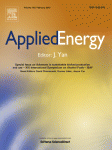
Political inequality and impacts on climate mitigation: the case of Germany's energy sector
Faus Onbargi, Alexia / Ines DombrowskyExternal Publications (2025)
in: Applied Energy 393, article 125928
DOI: https://doi.org/10.1016/j.apenergy.2025.125928
Open access
To meet the Paris Agreement's aim of limiting global warming to 1.5 degrees Celsius, there is an urgent need for countries to reduce their greenhouse gas emissions by transitioning their energy sectors from fossil-based to zero‑carbon sources. Despite strong climate policies and gradual emissions reductions, Germany remains the greatest emitter in the European Union. Coal, responsible for almost 35 % of the country's CO2 emissions, is not scheduled to be phased out until 2038. Wind, one of Germany's greatest sources of renewable energy, has faced challenges due to a 1000 m federal ‘rule’ between residential buildings and wind turbines. The German coal phase-out and the onshore wind phase-in are linked to questions of procedural injustice in energy, as showcased in multiple studies. In this paper we develop a comprehensive framework that introduces the concept of political inequality as a lens to examine procedural injustice in energy transition decision-making, arguing that it offers greater nuance. We apply the framework to Germany's coal phase-out and onshore wind phase-in, asking how stakeholders in the German energy transition – i.e. the Energiewende - report political inequalities of voice, representation, treatment and influence in these decision-making processes, both at the federal level and in the state of North Rhine-Westphalia. We also explore how such inequality impacts climate mitigation in Germany's energy sector and whether it slows progress. Our findings from twenty-eight semi-structured interviews with German decision-makers, civil society and activists, highlight multiple reported inequalities in these processes that point to several procedural injustices in energy transition decision-making in Germany. However, while political inequalities can indeed slow progress on climate mitigation in the energy sector, the reverse may also materialise. Further research is needed to understand how the tension between political inequality and climate mitigation unfolds in the German energy sector and in the broader energy transition.


